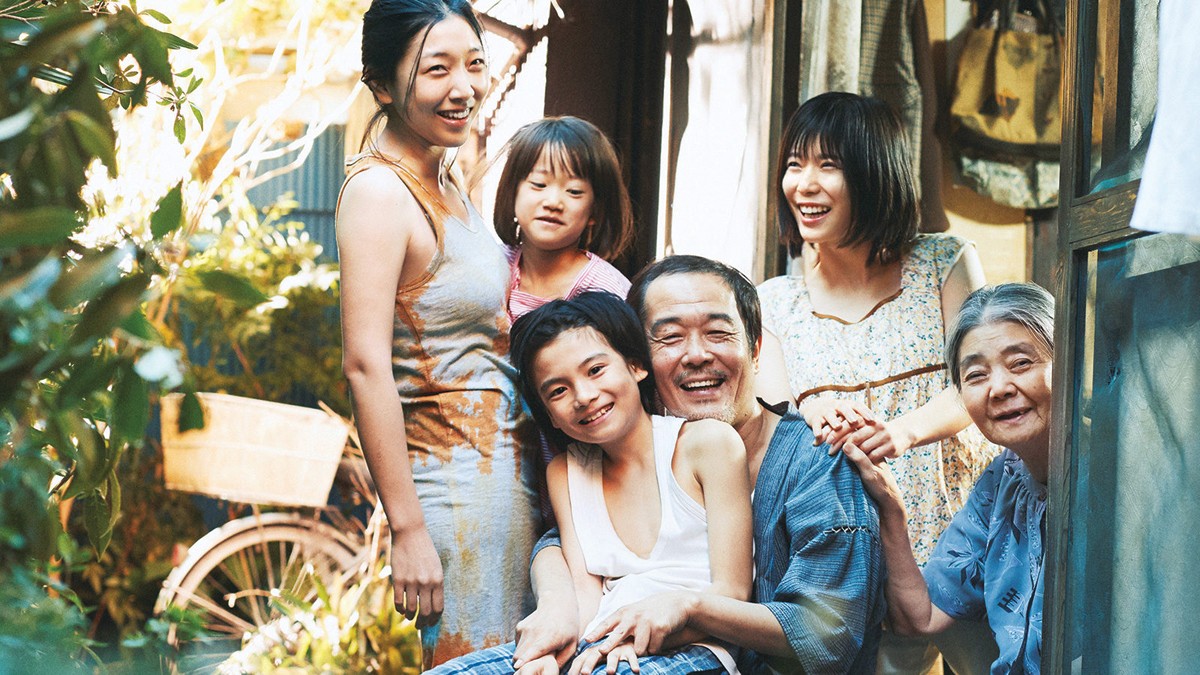Shoplifters, from Japanese auteur Hirokazu Koreeda (Our Little Sister, After the Storm), is a captivating domestic drama with salient moral themes. It's about a ragtag family of small-time crooks making ends meet in Tokyo. The film is the best of Koreeda's I've seen and took home the Palm D'or at last year's Cannes Film Festival. It will be a likely nominee in the Oscars' foreign language category. It opens Friday — where else — at the Cedar Lee.
To convey its accomplishments, it might help to compare it to two similar films that also enjoyed widespread critical acclaim this year: Roma, from Alfonso Cuaron, and Burning, from Chang-dong Lee. All three films are the work of visually oriented foreign-language writer-directors. They're all beefy (or bloated) as well, with run times in excess of two hours. Roma portrayed the life of a housemaid in an upper middle-class Mexico City neighborhood. Burning, adapted from Haruki Marukami's adaptation of the William Faulkner short story "Barn Burning," was a slow-burn Korean thriller.
Shoplifters is better than both.
Like Roma, it's a patient and observant portrait. We see poor people humanized as they cobble together meals and entertainment with what little they have. The "plot," in other words, takes a back seat. There is pleasure and value in watching people exist, unhurried, in an unfamiliar milieu. While the black and white Roma is more striking visually, Shoplifters achieves the same emotional power across a more complex and balanced script, with a criminal mystery that starts tugging at every scene, every interaction.
Burning played with this dynamic as well. Class tension and criminal suspicion created scenes of delicious suspense as a protagonist, who became obsessed with a crime that did not exist, missed a key revelation right before his eyes. In Shoplifters, the crimes are not at all obscured. Instead, they are rationalized. The question for the audience is the degree to which we're willing to accept the rationalizations.
The film opens with a coordinated act of shoplifting in a supermarket. Osamu Shibata (Lily Franky) and his adopted son, Shota (a phenomenal Jyo Kairi) have done this many times before, it's clear. Stealing from local convenience stores is how the family supplements their primary source of income, a grandmother's government pension. On their way home, they encounter a young girl in the enclosed porch of her house. She seems hungry and distraught, so they take her home for a meal.
But then they keep her, curiously without much objection from the other family members. They're not asking for a ransom, Osamu's wife Nobuyo (Sakura Ando) says. So it's not really kidnapping. Besides, they tried to take her back, but they overheard a shouting match at her home. Little Yuri's real parents didn't even want her. She had scars on her arms, too, evidence of domestic abuse. Wouldn't she be better off with the Shibatas? But when they change Yuri's name to "Lin" and cut her hair short, the "rescuing" of the child becomes more complicated.
A version of the same self-serving logic justifies other crimes. Shoplifting is okay, the parents tell their children, because when they steal from a store, it doesn't go bankrupt. But as the crimes become more serious, and as the family unit reveals itself as the product of a larger criminal conspiracy, Shota intuits the essential wrongness of his life. (Stealing from a store is one thing, he recognizes in a pivotal scene, but stealing from someone's car? That's not okay. He sees and understands the consequences.) A courageous act sparks a final unraveling.
And yet, there are no easy villains. These crooks are extraordinarily sympathetic outcasts who have been thrown away by society and are merely trying to survive. Among other things, they are loving parents. And the question the film begs us to consider is whether family is something you're born into or something you choose. When Osamu and Nobuyo are questioned by cops late in the film, one officer asks Osamu if he felt guilty for teaching Shota how to steal. His response is heartbreaking: "I had nothing else to teach him."











